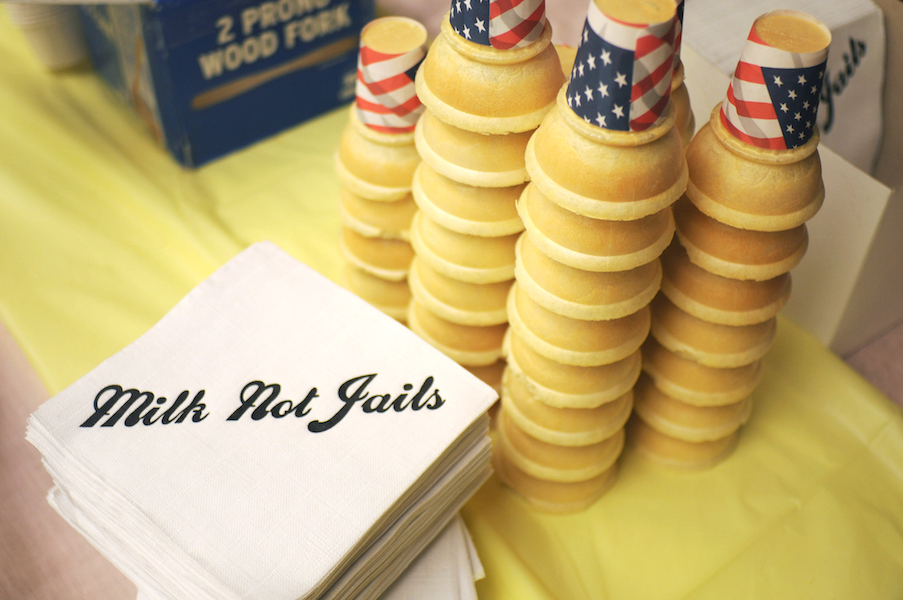Can you revolutionize New York State’s prison system by selling milk?
That’s the premise behind Milk Not Jails, a two-year-old political-campaign-cum-start-up business that’s trying to address a less-than-intuitive intersection of two problems: the injustices in our jail system and the struggles of New York’s dairy farmers.
What on earth do milk and jails have to do with each other? “That’s the first question everybody asks,” says Lauren Melodia, the group’s founder, who may be the only person in New York City with the background to see the connection. She knows the local food world (she’s worked at several Greenmarket stands and manages a CSA in Bed Stuy). But she also knows the prison movement, having organized a long drawn out—but ultimately successful— campaign to slash the outrageous prices prisoners were being charged for phone calls.
After that campaign, the 30-year-old spent a year in an upstate New York prison town, investigating obstacles to prison reform. And here’s one of the biggest: the farming industry, which used to be the basis of the upstate economy, has been hammered by the dominance of mega-processors that set their own (low) prices for what farmers produce. (The biggest of them, Dean Foods, controls 70 percent of the Northeast’s milk market.)
And what has stepped in to replace those dairy farmers? Prisons. The Department of Correctional Services spends $2.5 billion a year and employs 31,000 people. About 75 percent of the state’s prisons are located in rural areas (the majority of them north and/or west of Albany). Voters and politicians there see prison jobs as vital to their economy, and fight furiously against reforms that they fear might force prisons to shrink, close or move closer to New York City, which is where 75 percent of prisoners come from. “Agriculture and the criminal injustice system interface in the same landscape,” Melodia says. “But incarceration shouldn’t be a jobs program.”
But in trying to address the problem, Melodia faces the long standing upstate-downstate disconnect. The first reaction of the rural residents she wanted to work with, she says, was what does a city person have to offer me? “I didn’t have anything these people wanted.” But then she realized that she did: customers. So she decided to create not just a movement, but a business—one that could help revive the upstate dairy industry by selling upstate milk (and eventually other farm products) directly to New York City residents under its own Milk Not Jails brand. Her ultimate, wildly ambitious goal is to build Milk Not Jails into a milk processing and distribution cooperative big enough to give Dean Foods a run for its money—and to funnel profits to farmers, rather than shareholders.
Right now, though, even the word “tiny” overstates the company’s size: Last summer, in a first-year pilot project, it sold milk from one farm to seven CSAs and some other Brooklyn residents. This year, Melodia’s working with 11 dairy farms, figuring out how much milk they want to sell and how much they need to be paid for it. And she’s expanding beyond CSAs to target cafés, day care centers and other institutions that need a lot of milk, but aren’t big enough to get low wholesale prices. So far, she says, most of the organization’s active volunteers come out of the prison movement, not the food movement. And at a recent organizing meeting (held in a borrowed conference room), her report focused on the ways she’s trying to stretch the group’s Kickstarter-raised seed money: The Center for Constitutional Rights has lent the group free office space for a few months, she’s located a pro bono designer to smarten up the Web site, and she’s hunting for the best food-buying software she can get her hands on (and afford).
When it came to political action, discussion broadened. Members made plans to go to Columbus Circle to leaflet the folk lined up for the weekly buses to upstate prisons and debated which of a long list of upcoming conferences and lobbying events they should get involved in. And then there are the group’s iconic ice-cream socials, which it stages around the state, explaining their message with help from cones and a cow costume. The aim is not just to get attention (though they do that), but to move downstate activists and upstate farmers past their prejudices. “I’ve heard a lot of really racist and xenophobic conversations in upstate prison towns,” she says, “but on the flip side, here in New York City, the people who do criminal justice advocacy talk about upstate people being inbred and backward.”
By staging parties, the group creates what Melodia calls a “safe space” for the two groups to meet. She’s quick to acknowledge the all but insurmountable obstacles Milk Not Jails faces. For starters, she says, “farmers are the hardest group in the world to organize. They don’t go anywhere.” And the business plan depends on persuading potential customers to pay more so giving farmers get a fair price.
But the group’s efforts have already begun to pay off. Last June, for instance, at the state’s biggest dairy festival, a bunch of New York City members amused the locals with a parade entry consisting of a pink-haired lady on stilts, the group’s ubiquitous ice-cream-cone mascot, and a small band playing “We Shall Overcome.” To their astonishment, the motley crew won the award for Best Overall Entry, as well as a lot of attention in the local news media. “And when we went to pick up our award,” Melodia says happily, “people said they understood what we were about.”
Licking abuse. Most New York prisons are in communities where dairy jobs are drying up. politicians fight reforms that could annoy employers but activists, who use ice cream socials to explain their campaign, say incarceration shouldn’t be a jobs program.
Photo credit: Phil Shipman.



